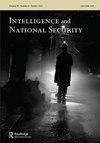Critical Intelligence Studies: a new framework for analysis
IF 0.8
3区 社会学
Q1 HISTORY
引用次数: 0
Abstract
ABSTRACT As the purpose of the study of intelligence is, in part, to aid the practice of intelligence, scholarship must reflect that practice. This article sets out a theoretical framework for Critical Intelligence Studies that will increase the real-world applicability of the study of intelligence as currently represented by Intelligence Studies. Critical Security Studies’ recognition of the broadening and widening of the concept of security, and the ensuing recognition that intelligence work is not only done by state intelligence agencies or for the security of states, provides an opportunity to push forward the study of intelligence into a position where a well-developed, and theoretically sound, Critical Intelligence Studies can be meaningfully said to exist.批判性智力研究:一个新的分析框架
由于智力研究的部分目的是帮助智力实践,学术必须反映这种实践。本文提出了批判性智力研究的理论框架,这将增加目前以智力研究为代表的智力研究在现实世界中的适用性。批判性安全研究对安全概念的拓宽和扩大的认识,以及随之而来的对情报工作不仅仅是由国家情报机构或为国家安全而做的认识,提供了一个机会,将情报研究推进到一个发展良好、理论上健全的位置,批判性情报研究可以有意义地说存在。
本文章由计算机程序翻译,如有差异,请以英文原文为准。
求助全文
约1分钟内获得全文
求助全文
来源期刊

Intelligence and National Security
Multiple-
CiteScore
1.80
自引率
41.70%
发文量
93
期刊介绍:
Intelligence has never played a more prominent role in international politics than it does now in the early years of the twenty-first century. National intelligence services are larger than ever, and they are more transparent in their activities in the policy making of democratic nations. Intelligence and National Security is widely regarded as the world''s leading scholarly journal focused on the role of intelligence and secretive agencies in international relations. It examines this aspect of national security from a variety of perspectives and academic disciplines, with insightful articles research and written by leading experts based around the globe. Among the topics covered in the journal are: • the historical development of intelligence agencies • representations of intelligence in popular culture • public understandings and expectations related to intelligence • intelligence and ethics • intelligence collection and analysis • covert action and counterintelligence • privacy and intelligence accountability • the outsourcing of intelligence operations • the role of politics in intelligence activities • international intelligence cooperation and burden-sharing • the relationships among intelligence agencies, military organizations, and civilian policy departments. Authors for Intelligence and National Security come from a range of disciplines, including international affairs, history, sociology, political science, law, anthropology, philosophy, medicine, statistics, psychology, bio-sciences, and mathematics. These perspectives are regularly augmented by research submitted from current and former intelligence practitioners in several different nations. Each issue features a rich menu of articles about the uses (and occasional misuses) of intelligence, supplemented from time to time with special forums on current intelligence issues and interviews with leading intelligence officials.
 求助内容:
求助内容: 应助结果提醒方式:
应助结果提醒方式:


